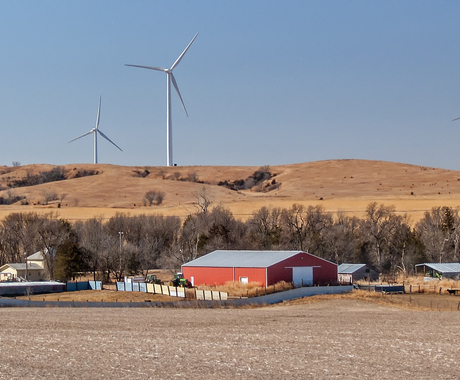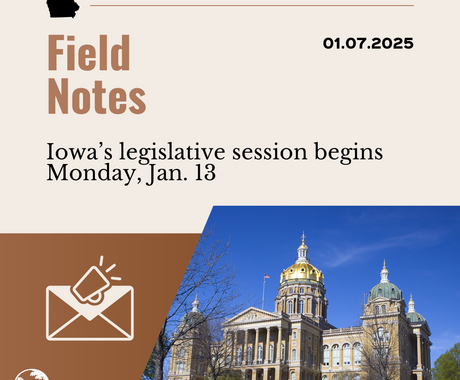By Jordan Rasmussen, former staff member
Elected representatives in Nebraska will debate a host of contentious issues during the 2019 legislative session, including economic development, budget and tax, health care, energy and environment, and food and agriculture.
Relevant developments concerning priority legislation will be shared via email. To sign up for updates, email [email protected].
Budget and tax
During the 2018 session, three prominent property tax proposals were brought forward, yet the session came to an end without the passage of property tax relief legislation. Variations of the bills will be reintroduced in 2019.
We will support bills that meaningfully address the property tax burden suffered by rural Nebraskans. We will defend against cuts to education and other social services important to low-income individuals. This session, we have an opportunity to play a key role in identifying and crafting legislation that provides property tax relief while meeting obligations for education, county, and other service funding.
Economic development
In 2018, we originated a bill to address broadband limitations in rural areas. Current broadband mapping requirements have led to a significant overstatement of availability, generating faulty decision making, mismanagement of resources, and creating challenges for policymakers seeking to improve broadband access for those currently unserved.
We also actively supported the creation of a Rural Broadband Task Force to develop a multifaceted approach to increase broadband access for rural customers. We successfully offered an amendment to include low-income, health care, and other consumer advocates as official members.
In 2019, funding set aside to encourage and facilitate economic development will face increased scrutiny. The Nebraska Advantage Act, originally passed in 2005, is once again subject to review. The Business Innovation Act Microenterprise program, important to the success of rural entrepreneurs across the state, must compete with Nebraska Advantage and other similar programs for limited dollars.
Rural economic development is a longstanding focus of our work. Technical assistance, targeted tax incentives, and microlending are proven strategies to boost rural economies, however, it is becoming increasingly difficult to set aside funding exclusively for rural microbusinesses. Each will be a focal point of our advocacy efforts in 2019.
Energy and environment
In 2016, the Legislature took steps to remove barriers to wind energy development and put Nebraska on even-footing with neighboring states. Legislation introduced in 2018 would have reversed many of those changes, just one of several attempts to eliminate or greatly reduce development. We expect more of the same in 2019.
In contrast, support for solar energy is growing. We anticipate opportunities to better facilitate growth, such as improved net metering policies, guidelines for community projects, and comprehensive generation goals.
We will support policy options that lead to economic development opportunities through renewable energy investment. We will defend and improve progress that has been made.
Food and agriculture
Property tax, combined with ongoing budget constraints, hindered food and agriculture policies that were brought forward in 2018. For example, attempts to add a veteran provision to the Beginning Farmer Tax Credit and to address the SNAP cliff effect both stalled in committee.
The 2019 session will again be dominated by property tax as the key agricultural issue. As was outlined in legislation during 2018, an end to the tangible personal property tax exemption is being considered. Ending this exemption is viewed as one way the agriculture community can compromise to achieve broader legislative gains.
We remain committed to bringing new populations into farming and our rural communities. We will advocate for continued use of the Beginning Farmer Tax Credit Act and amending the act to add a provision for the benefit of beginning veteran farmers.
Health care
We played an important role in bringing Medicaid expansion to the 2018 ballot and in the passage of Initiative 427. Our work to collect signatures and stories, as well as to educate on the importance of closing the insurance coverage gap helped garner the necessary votes.
Our primary goal within health care is the implementation of expanded Medicaid coverage for low-income Nebraskans who have fallen into a coverage gap. We will also expand our advocacy for existing services and the necessity for additional access to health care services in rural areas. We seek opportunities to advocate for health care workforce development in our communities.
Other issues in Nebraska
Adverse Possession - Nebraska law does not require that an adverse possessor prove payment of property tax in order to satisfy a claim. Nebraska law also does not make payment of property taxes an affirmative defense. In 2017, we initiated legislation to a) require that property tax be paid by the adverse possessor over the statutory period in order to satisfy an adverse possession claim and b) require that any adverse possessor compensate the original owner for any property tax paid during the statutory period. This bill will be reintroduced in 2019. Similar legislation will be introduced in 2019.
What do you think?
Let us know your input on these priorities and tell us about other state issues that are important to you. Are you interested in writing a letter to your legislator or even testifying at the state capitol? Email us at [email protected].





